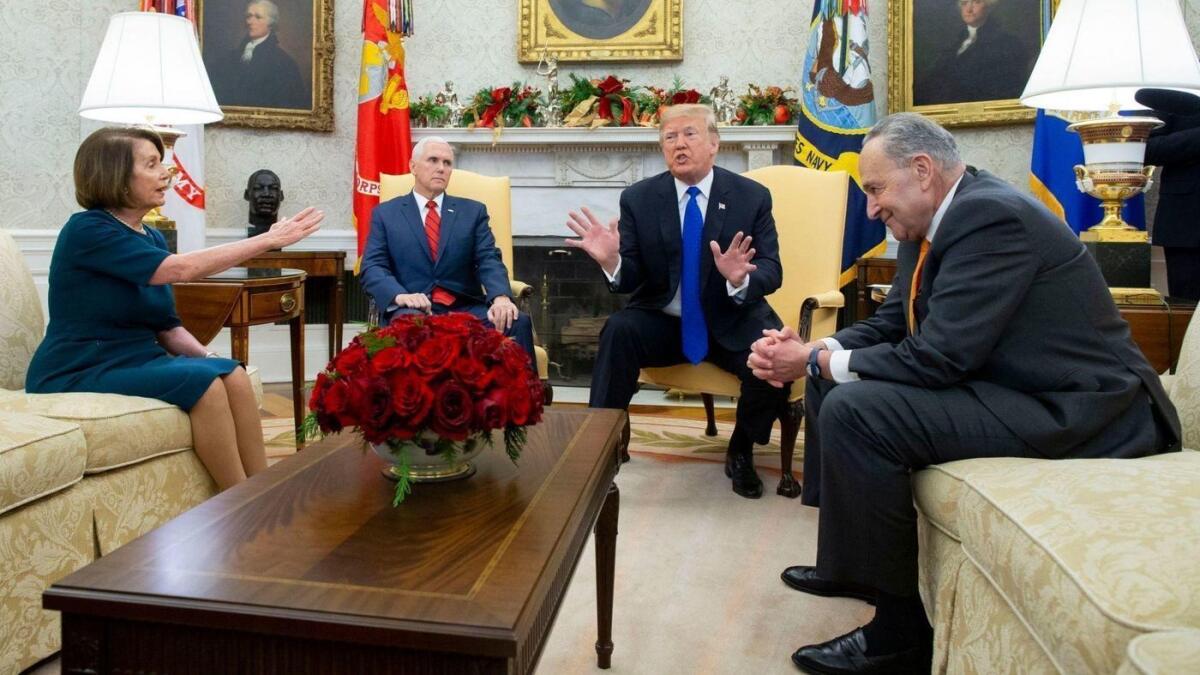Trump seems to retreat from threat to shut down the government over money for a border wall

Reporting from Washington — President Trump appeared to back away on Tuesday from threats to shut down parts of the federal government over his demands for billions for his border wall, though he left Congress unclear about what deal he would accept to avert closure after midnight Friday.
Trump, who has been demanding $5 billion in additional wall funding, said last week during a meeting with Democratic House and Senate leaders that he would be “proud” to shut down the government if his demand wasn’t met.
In an interview Tuesday morning with Fox News, however, White House Press Secretary Sarah Huckabee Sanders said, “We have other ways that we can get to that $5 billion.” She did not offer specifics.
Her comments, which Trump did not disavow in later remarks to reporters, came just four days before funds for about a quarter of the government are due to expire, and followed two days of steep declines on Wall Street. “At the end of the day, we don’t want to shut down the government, we want to shut down the border,” Sanders said.
“There are certainly a number of different funding sources that we’ve identified that we can use, that we can couple with money that would be given through congressional appropriations that would help us get to that $5 billion that the president needs in order to protect our border,” she said.
The president does have limited powers to shift federal funds among budget accounts, but Trump would be unlikely to find several billions more than Congress provides or to proceed with wall construction without meeting congressional resistance.
“They need congressional approval,” said Sen. Charles E. Schumer of New York, the Senate Democratic leader. “They’re not getting it.”
Republican congressional leaders have made clear to the White House that they do not want a shutdown, and, on Capitol Hill, they barely conceal their rising frustration with a president who makes threats without having any legislative strategy or backup plan that his party is aware of.
Sen. John Thune of South Dakota, the third-ranking Republican in the Senate, said of Sanders’ statements, “I assume she’s speaking on behalf of the president, so maybe there’s a negotiation going on that’s going to find us a solution.”
In the Senate, Republican leaders were preparing a stopgap measure that would continue current government funding levels into early February, according to Sen. Richard C. Shelby (R-Ala.), chairman of the Senate Appropriations Committee. The bill could be acted on as soon as Wednesday.
Other possible options are a spending bill that would cover the full fiscal year, until Oct. 1, with $1.6 billion in border security, or an impasse that forces a partial government shutdown, but those appeared less likely as of Tuesday evening.
“I think that the White House is looking, like we are, to figure out how we can get to yes,” Shelby said after a closed-door meeting with Schumer and Senate Majority Leader Mitch McConnell (R-Ky.) in McConnell’s office.
Democrats rejected one proposal from Republicans that called for appropriating $1.6 billion for border security separate from the wall project and an additional $1 billion that Trump could spend as he sees fit, potentially on construction.
“We cannot accept the offer they made of a billion-dollar slush fund for the president to implement his very wrong immigration policies,” said House Minority Leader Nancy Pelosi (D-San Francisco).
McConnell, after a lunch meeting of Senate Republicans, expressed confidence that a shutdown would be averted, even as he acknowledged that congressional leaders continued to seek clarity on what compromise the president will accept.
“I think a government shutdown is not a good option,” McConnell said. “I’m discussing with the White House where we go next. Once I get an answer to that, I’ll talk to Sen. Schumer again and see what we can do. I think there’s certainly bipartisan support for avoiding a government shutdown.”
Republicans left their lunch meeting with no resolution — only a desire to vote for some spending bill by the end of the week to avoid going home looking like they did nothing.
“There was nobody suggesting a government shutdown was a good thing to do,” said Sen. Mike Rounds (R-S.D.).
Asked whether Trump would agree to a short-term measure that funds the government into January, Sen. John Kennedy (R-La.) replied, “We would respectfully like that answer before we go pass it.”
Other Republicans, with some relief, interpreted Sanders’ comments as a signal that the White House had opened the door to approving a bill without Trump’s wall funding. Yet the president and his aides showed little inclination to resolve the stalemate.
Sanders, at her first White House press briefing in more than a month, put the onus squarely on Republican leaders to take the next steps toward averting a shutdown, and wouldn’t say what proposal would garner Trump’s approval.
“Once again, we want to see what the Senate can pass. They’ve thrown out a lot of ideas,” she said, adding, “Once they make a decision and they put something on the table, we’ll make a determination on whether or not we’ll move forward on either a short-term or long-term.”
Trump, speaking to reporters later at a White House event on school safety, was also noncommittal. “We’ll see what happens,” he said. “It’s too early to say.”
The president dodged a question from a reporter who asked if he still might shut down the government if he didn’t get the wall funding he has demanded. “We need border security,” he said.
Twitter: @EliStokols
Twitter: @jenhab
More to Read
Get the L.A. Times Politics newsletter
Deeply reported insights into legislation, politics and policy from Sacramento, Washington and beyond. In your inbox three times per week.
You may occasionally receive promotional content from the Los Angeles Times.












